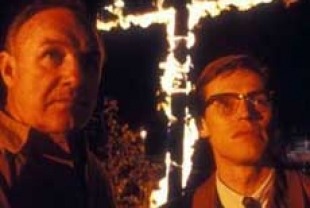Mississippi Burning is set in 1964 when three civil rights workers are murdered in a small town by members of the Ku Klux Klan. Although based on a true incident, Chris Gerolmo's screenplay centers mainly on the antagonistic relationship between two fictional FBI agents who are sent to the racially torn community to handle the case. Willem Dafoe plays Ward, a zealous Harvard graduate who has earned his high rank as a member of Robert Kennedy's Justice Department. This by-the-book agent wants to draw out the killers by making the town the focus of national media attention. Gene Hackman, in a colorful and Academy Award-caliber performance, plays Anderson, a former Mississippi lawman who uses his charm to win the confidence of the deputy sheriff's unhappy wife. Her testimony, he's convinced, holds the key to what really happened to the three civil rights workers.
Alan parker, the director of Midnight Express, graphically depicts the ways in which the blacks are terrorized by lynchings, beatings, and the burning of their homes and churches. But in the last analysis, the film violates the most laudable legacy of the Civil Rights era. In his Nobel Peace Prize acceptance speech, Dr. Martin Luther King, Jr., expressed it by saying: "Nonviolence is the answer to the crucial political and moral questions of our time; the need for man to overcome oppression and violence without resorting to oppression and violence.' In this film, the struggle between nonviolence and violence is nowhere to be seen. Instead, the FBI agents under Anderson's direction throw restraint and legal procedure out the window in order to identify the killers. That makes them as barbaric and dehumanized as their racist adversaries. Mississippi Burning ends as an ode to the kind of wild justice predicated on violence which has peppered American history but which goes against the very principles of civil rights and individual liberties.
